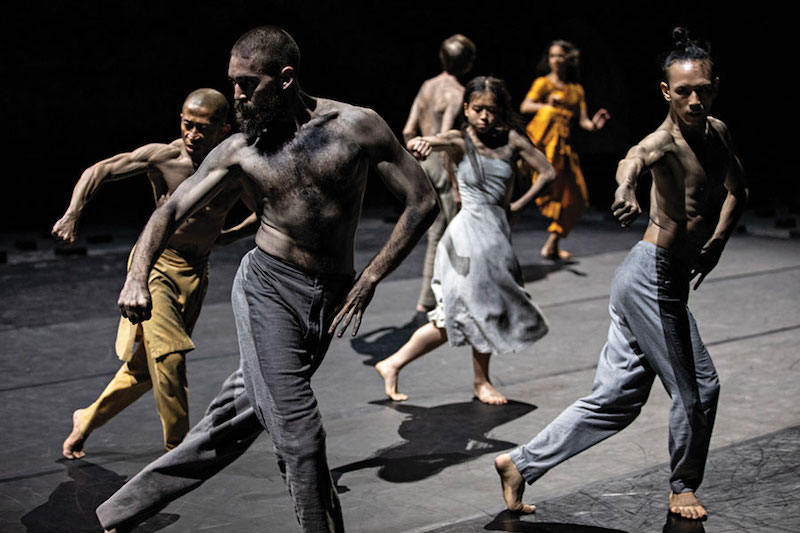Akram Khan’s work turns a mirror to humanity. With a foot in both Western and non-Western canons, the choreographer of Bangladeshi descent speaks with a sense of universal urgency. His latest work, Outwitting the Devil, is no less exigent. Based on ancient myth, but unconcerned with constraints of time, it’s a sobering comment on the power we wield against those around us.
The work’s inspiration comes from a recently discovered fragment of the 12 broken clay tablets that tell the ancient Sumerian Epic of Gilgamesh. Khan has decided to focus on a particularly violent chapter in the young king’s life, as recalled by his older, dying self. Gilgamesh – now confronted with his own mortality – looks back on his exploits: domesticating a wild man, destroying the Cedar Forest, and surviving retribution from the Gods.
 Outwitting the Devil. Photograph © Jean Louis Fernandez
Outwitting the Devil. Photograph © Jean Louis Fernandez
Although Khan himself does not appear (he recently retired from dancing), his masterful storytelling remains vivid, amplified through an exceptionally skilled and diverse cast. The older Gilgamesh (Dominique Petit), navigates his way through hundreds of fragmented ruins (set design by Tom Scutt) and the ensemble of characters they enclose. Immersed in his own memories, the ageing king watches intently; sometimes relishing in his murderous passions, at other times, in total disbelief.
Bringing the story to life are four dancers (Ching-Ying Chien, Jasper Narvaez, Sam Asa Pratt and former Chunky Move dancer James Vu Anh Pham) who slip between states of abstraction and hyper-dramatic characterisation. Grounded, heeled stomping and spinning in circular patterns give way to beastly and animalistic portraits defined by hissing or protruding tongues. The movement is earthly and fluid, constantly shifting pace and rhythm.
Weaving through the space in a burnt orange sari – the only stroke of colour in the work – is a deity figure, stunningly danced by Mythili Prakash. Her movement evokes Khan’s signature kathak-contemporary physicality, paired with Bharatanatyam hand movements. The steadiness of Prakash’s movement is mesmerising; a sublime counterpoint to the increasingly chaotic destruction that encircles the king.
Compositionally, this is an intelligent work. The roaming older Gilgamesh, like a wizened narrator, not only directs the story but doubles as a conduit for our own reckoning. Like the old king trying to grapple with his past, we see our own decisions reflected back at us – the violence we inflict on other people and places, and the permanency of those choices. The deity too, constant through all time and space, serves to judge us.
Khan has again partnered with composer Vincenzo Lamagna to produce an original score that helps drive emotional arcs whilst avoiding sentimentality. High frequency ringing sounds and digital distortion merge with brooding cellos, intercutting abruptly as we hurtle from one memory to another.
The true strength, however, of this work lies in the diversity and talent of the cast. The dancers are not just technically outstanding (especially Pham and Narvaez with their boneless fluidity and exceptional control), but they embody the themes of the work in their own way, shaped by their personal histories and experiences. Khan understands the body’s capacity to retain and share stories, and seems to have taken great care in bestowing the performance role to others.
Outwitting the Devil is a densely layered survey of memory inspired by an ancient myth, which, under Khan’s hand, demands contemporary relevance. It’s is a formidable start to the next chapter of this celebrated choreographer’s repertoire.











Comments
Log in to join the conversation.